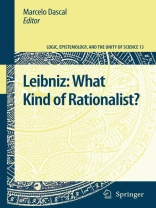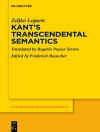Gottfried Wilhelm Leibniz was an outstanding contributor to many fields of human knowledge. The historiography of philosophy has tagged him as a “rationalist”. But what does this exactly mean? Is he a “rationalist” in the same sense in Mathematics and Politics, in Physics and Jurisprudence, in Metaphysics and Theology, in Logic and Linguistics, in Technology and Medicine, in Epistemology and Ethics? What are the most significant features of his “rationalism”, whatever it is?
For the first time an outstanding group of Leibniz researchers, some acknowledged as leading scholars, others in the beginning of a promising career, who specialize in the most significant areas of Leibniz’s contributions to human thought and action, were requested to spell out the nature of his rationalism in each of these areas, with a view to provide a comprehensive picture of what it amounts to, both in its general drive and in its specific features and eventual inner tensions.
The chapters of the book are the result of intense discussion in the course of an international conference focused on the title question of this book, and were selected in view of their contribution to this topic. They are clustered in thematically organized parts. No effort has been made to hide the controversies underlying the different interpretations of Leibniz’s “rationalism” – in each particular domain and as a whole. On the contrary, the editor firmly believes that only through a variety of conflicting interpretive perspectives can the multi-faceted nature of an oeuvre of such a magnitude and variety as Leibniz’s be brought to light and understood as it deserves.
Inhaltsverzeichnis
Reinterpreting Leibniz’s Rationalism?.- Leibniz’s Rationalism: A Plea Against Equating Soft and Strong Rationality.- Leibniz’s Two-Pronged Dialectic.- Leibniz’s Rationality: Divine Intelligibility and Human Intelligibility.- Natural Sciences and Mathematics.- De Abstracto et Concreto: Rationalism and Empirical Science in Leibniz.- Leibniz Against the Unreasonable Newtonian Physics.- Some Hermetic Aspects of Leibniz’s Mathematical Rationalism.- Symbolic Inventiveness and “Irrationalist” Practices in Leibniz’s Mathematics.- The Art of Mathematical Rationality.- Epistemology.- Ramus and Leibniz on Analysis.- Locke, Leibniz, and Hume on Form and Experience.- Leibniz’s Conception of Natural Explanation.- The Role of Metaphor in Leibniz’s Epistemology.- What Is the Foundation of Knowledge? Leibniz and the Amphibology of Intuition.- Law.- Leibniz: What Kind of Legal Rationalism?.- On Two Argumentative Uses of the Notion of Uncertainty in Law in Leibniz’s Juridical Dissertations about Conditions.- Contingent Propositions and Leibniz’s Analysis of Juridical Dispositions.- Leibniz on Natural Law in the Nouveaux essais.- Ethics.- Authenticity or Autonomy? Leibniz and Kant on Practical Rationality.- The Place of the Other in Leibniz’s Rationalism.- Morality and Feeling: Genesis and Determination of the Will in Leibniz.- Leibniz and Moral Rationality.- Decision Making.- Leibniz’s Models of Rational Decision.- The Specimen Demonstrationum Politicarum Pro Eligendo Rege Polonorum: From the Concatenation of Demonstrations to a Decision Appraisal Procedure.- Declarative vs. Procedural Rules for Religious Controversy: Leibniz’s Rational Approach to~Heresy.- Apology for a Credo Maximum: On Three Basic Rules in Leibniz’s Method of Religious Controversy.-Religion and Theology.- Convergence or Genealogy? Leibniz and the Spectre of Pagan Rationality.- “Paroles Entièrement Destituées de Sens”. Pathic Reason in the Théodicée.- The Authority of the Bible and the Authority of Reason in Leibniz’s Ecumenical Argument.- Leibniz on Creation: A Contribution to His Philosophical Theology.- The Metaphysics of Rationality.- For a History of Leibniz’s Principle of Sufficient Reason. First Formulations and Their Historical Background.- Innate Ideas as the Cornerstone of Rationalism: The Problem of Moral Principles in Leibniz’s Nouveaux Essais.- Causa Sive Ratio. Univocity of Reason and Plurality of Causes in Leibniz.












